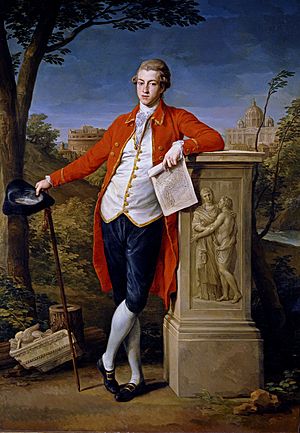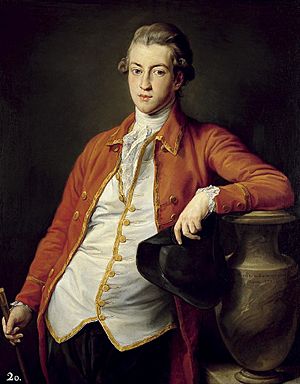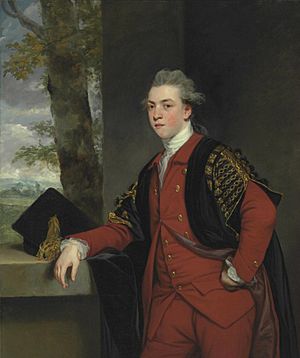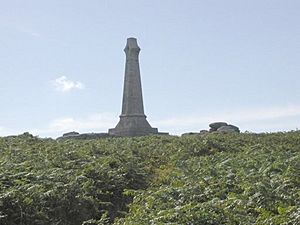Francis Basset, 1st Baron de Dunstanville facts for kids
Quick facts for kids
The Lord de Dunstanville
|
|
|---|---|
 |
|
| Member of Parliament for Penryn |
|
| In office 1780–1796 |
|
| Preceded by | Sir George Osborn William Chaytor |
| Succeeded by | Thomas Wallace William Meeke |
| Personal details | |
| Born | 9 August 1757 England |
| Died | 14 February 1835 (aged 77) London, England |
| Spouses | Frances Susanna Hippesley-Coxe (m. 1780) Harriet Lemon (m. 1824) |
| Children | Frances Basset, 2nd Baroness Basset |
| Education | King's College, Cambridge |
Francis Basset, 1st Baron de Dunstanville (born 9 August 1757 – died 14 February 1835) was an important English politician and a member of the nobility. He served in the British Parliament from 1780 to 1796. He was also a Fellow of the Royal Society, a group that promotes science.
Contents
Early Life and Family Wealth


Francis Basset was the oldest son of Francis Basset and Margaret St. Aubyn. His family was a very wealthy and powerful one in Cornwall, England. They owned a lot of land and many valuable mines.
The Basset family became rich from their tin and copper mines. In 1873, they were the fourth largest landowners in Cornwall. One of their most important mines was Dolcoath, which was one of Britain's richest copper mines.
Francis Basset was a smart businessman. He was a partner in the Cornish Bank of Truro. He also led the Cornish Metal Company. These roles helped him make his family's fortune even bigger.
Education and Grand Tour
Francis Basset went to famous schools like Harrow School and Eton College. He also studied at King's College, Cambridge. In 1777, he left university early to go on a "Grand Tour" of Italy. This was a common trip for young, wealthy men to learn about art and culture.
While in Rome, a famous artist named Pompeo Batoni painted his portrait. This painting was sent to England but was captured by the French. Today, two portraits of him by Batoni are in museums in Madrid, Spain.
Political Career and Influence
When Francis Basset returned to England in 1778, he became a Recorder (a type of judge) in Penryn. His family had a lot of influence in Cornwall. This helped him become a Member of Parliament for Penryn. He held this seat from 1780 to 1796.
In 1779, during the American Revolutionary War, Francis Basset showed his leadership. He led 600 Cornish miners to Plymouth to help defend the town from a possible French and Spanish attack. For this, the King made him a Baronet (a special title of honor) in November 1779.
Francis Basset was one of the most powerful political figures in Cornwall. He often competed with other influential families for control over elections. He was against electoral reform, which would have changed how elections worked. He saw this as a threat to his family's power.
In 1796, he was given the title of Baron de Dunstanville. A year later, he was also made Baron Basset of Stratton. This second title had a special rule: it could be passed down to his daughter.
Marriages and Family Life
Francis Basset married twice. His first wife was Frances Susanna Hippesley-Coxe. They married in 1780. They had one daughter:
- Frances Basset, 2nd Baroness Basset: She inherited his second title, Baroness Basset, because of the special rule.
His first wife passed away in 1823. In 1824, when he was nearly 70 years old, he married Harriet Lemon. They did not have any children together. People thought he married again hoping to have a son to inherit his titles. However, he never had a male heir, and his daughter Frances never married or had children.
Death and Legacy
Francis Basset died in London on 14 February 1835. Since he had no sons, his first title, Baron de Dunstanville, and his baronetcy ended. However, his second title, Baron Basset, passed to his daughter, Frances.
His funeral was a very large event in Cornwall. It was like a state occasion, with his coffin lying in state in several towns. Shops closed in Truro, and church bells rang. About 20,000 people attended the funeral procession from Tehidy Park to Illogan church.
Basset Monument

On the highest point of Carn Brea in Cornwall, there is a 90-foot (27-meter) tall celtic cross. It was built in 1836 using money from public donations. This monument is dedicated to Francis Basset. It is inscribed: "The County of Cornwall to the memory of Francis Lord de Dunstanville and Basset A.D. 1836".
In Literature
Francis Basset is a character in the famous Poldark novels by Winston Graham. In the books, he is shown as a generally good person. The novels describe his long rivalry with another powerful family, the Boscawens, over political control in Cornwall. This includes their competition for influence in the pocket borough of Penryn.

